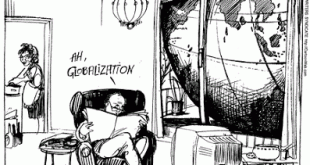To think correctly about globalization one needs to think of it in historical context. This means seeing today’s globalization and its effects, positive and negative, as in many ways a mirror-replay of the first globalization that took place from the mid-19th century to the First World War.... That globalization was grounded in imperialism and colonialism. WWI was the culmination of this, and the aftermath was its dénouement. That led to the rise of neo-imperialism and...
Read More »Trump’s Brilliant Strategy to Dismember U.S. Dollar Hegemony
Your access to this site has been limited Your access to this site has been limited Your access to this service has been temporarily limited. Please try again in a few minutes. (HTTP response code 503) Reason: Exceeded the maximum global requests per minute for crawlers or humans. If you are a WordPress user with administrative privileges on this site please enter your email in the box below and click "Send". You will then receive an email that helps you regain access. Click here...
Read More »The Fracturing of Globalization: Implications of Economic Resentments and Geopolitical Contradictions
The last forty years have witnessed a third wave of globalization which can be termed “neoliberal globalization”. Now, there are indications that the era of neoliberal globalization might be drawing to a close, as evidenced by the trade war between the US and China. This paper argues the fracturing of neoliberal globalization reflects the growing […]
Read More »Crashed: How a Decade of Financial Crises Changed the World
Book Review Adam Tooze. Crashed: How a Decade of Financial Crises Changed the World. Viking. New York. 2018 The global economic crisis is now more than a decade old, and is far from definitively behind us. Indeed, many fear, with good reason, that the recent, uneven and lethargic global recovery may soon come to an end, and that the next crisis of global capitalism could be even worse than that of 2008. The financial crisis and resulting crisis of the real global economy triggered by the...
Read More »Scott Ferguson — The Shape of Law
Titled Declarations of Dependence: Money, Aesthetics, and the Politics of Care (University of Nebraska Press, July 2018) my recent book develops the insights of Modern Monetary Theory (MMT) for critical theory and aesthetics. While the modern Liberal imagination treats money as a finite, private and decentralized exchange instrument that seems incapable of serving all, MMT’s state or “chartalist” approach to political economy insists that money is an inalienable public utility that can...
Read More »Leo Panitch on Obama and Globalization
From the Real News Network: [embedded content] This Real News segment with Professor Leo Panitch is worth watching for those that miss Obama (perhaps should be seen together with the reading of this piece on Mike Pence, for those that think that he would be much better than the orange one). At any rate, besides the fact that Obama was not even for more than a very moderate reform of the system, and that he still justifies globalization in neoliberal terms, it seems to me that Panitch (and...
Read More »Three Globalizations, Not Two: Rethinking the History and Economics of Trade and Globalization
By Thomas Palley (Guest blogger)The conventional wisdom is there have been two globalizations in the modern era. The first began around 1870 and ended in 1914. The second began in 1945 and is still underway. This paper challenges that view and argues there have been three globalizations, not two. The first half of the paper provides empirical evidence for the three globalizations hypothesis. The second half discusses its analytical implications. The Victorian first globalization and...
Read More »Globalization Checkmated? Political and Geopolitical Contradictions Coming Home to Roost
By Thomas Palley (Guest blogger)The deepening of economic globalization appears to have ground to a halt and the process may even unravel a little. The sudden stop has surprised economists, whose belief in globalization has strong parallels with Fukuyama’s (1989) flawed end of history hypothesis. The paper presents a simple analytic model that shows how economic globalization has triggered political and geopolitical contradictions. For the system to work, politics within countries and...
Read More »Three Globalizations, Not Two: Rethinking the History and Economics of Trade and Globalization
The conventional wisdom is there have been two globalizations in the modern era. The first began around 1870 and ended in 1914. The second began in 1945 and is still underway. This paper challenges that view and argues there have been three globalizations, not two. The first half of the paper provides empirical evidence for [...]
Read More »Globalization Checkmated? Political and Geopolitical Contradictions Coming Home to Roost
The deepening of economic globalization appears to have ground to a halt and the process may even unravel a little. The sudden stop has surprised economists, whose belief in globalization has strong parallels with Fukuyama’s (1989) flawed end of history hypothesis. The paper presents a simple analytic model that shows how economic globalization has triggered [...]
Read More » Heterodox
Heterodox

